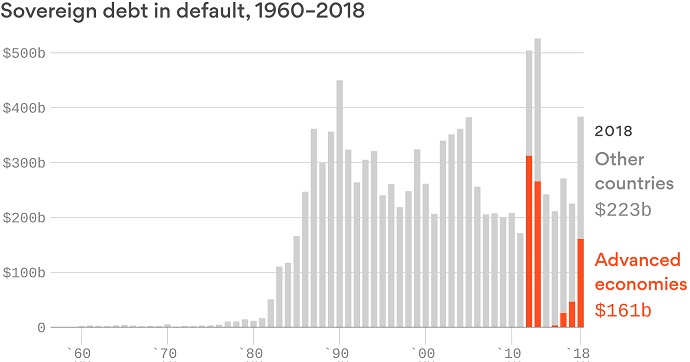
Developed countries default
Countries defaulting on their debts have caused enormous problems for the international financial system since the Latin American debt crisis of the mid-1980s. But until this decade, the world’s developed countries always found themselves as the creditors, not the debtors.
- Greece changed thatin 2012, when it became the biggest deadbeat sovereign of all time.
What’s new: The world’s most comprehensive database of sovereign defaults, run by the Bank of England and the Bank of Canada, has been updated for 2018, and once again advanced economies are driving the numbers.
- Not only was Puerto Rico in defaultto the tune of $50 billion, but Greece also defaulted on $111 billion owed to the EU. (The European Stability Mechanism allowed Greece to push back its debt service payments and reduce the interest rate it was paying, which counts as a debt default for the purposes of the database.)
- The other big debtors in 2018:Venezuela with $64 billion of debt in default and Iraq with $41 billion.
The big picture: As countries struggle with growing debt burdens, sovereign debt problems will become increasingly common.
- Argentina looks certain to default again; Venezuela has lost control of Citgo, its most valuable asset; even Portugal was added to the database in 2013 thanks to another EU restructuring.
- Conceivably, even the U.S.could find itself in default if congressional gridlock prevented the debt ceiling from being raised.
- Puerto Ricomight emerge from default in the coming months, albeit with a huge remaining debt burden. As we’ve seen with Greece and Argentina, once you’ve defaulted once, that often makes it more likely that you’re going to default again.
Info

Adapted from Beers, et. al, 2019, “The BoC-BoE sovereign default database: What’s new in 2019?“; Chart: Andrew Witherspoon/Axios
Πηγή: axios.com




